Alexander Joseph (AJ) Taylor, PhD student at University of Illinois at Urbana Champaign
There have only been a few moments in my life that time actually slowed down. I don’t really mean in the lulls or quiet moments with a book and a cup of tea. I am talking about when time actually seemed to slow to a creeping halt. Like the moment of riding front seat of a rollercoaster that is about to drop. The anxiety, the stress, the silent, mental prayer; everything just seems to be heightened, yet completely numb to what is happening. I would like to think that I have nerves of steel, that even in tough moments I can stand tall and be strong. My years in theater trained me for the dark faces of an on-looking audience, the way-too-bright lights of a stage, and the hushed silence until someone speaks. However, the theater did not train me well for being in front of a crowd of IFT members, and being a finalist of the IFTSA Graduate Research Video Competition. It did not train me well to listen for my name to be called as the winner. It did also did not train me well to listen to my name not to be called as the winner. Needless to say, I was on that rollercoaster, front seat, staring down a drop and I did not know if I was going to enjoy this ride or fear every second of it.
However, as the crowd started cheering and applauding, people walking towards me with hands out and congratulations being said, I started connecting the dots all together. After six grueling weeks and countless hours spent making a three-minute video about my research prospects, it all paid off. I was the winner of the IFTSA Graduate Research Video Competition. As I recount this moment, I am only left with words of gratitude, appreciation, and kindness to every single person that helped make my video as great as it is. The winner of this competition is selected to attend a 10-day industry visit, through Campden BRI, in the United Kingdom and other European-based companies. This allowed for connections to be made from academic and industry perspectives, as well as EU/UK-perspectives from start to finish. The competition helps to build a bridge between academic institutions and their industrial counter parts. So if you are a graduate student, I cannot urge you enough to go out and make your own 3-minute video and submit!
Typically, the industry visit occurs between September and December, depending on time and opportunities available. My trip started on November 14th and ended on the 30th, but that was because I had friends in Scotland I wanted to visit the weekend before the industry whirlwind began on the 18th. As I came in to the UK on the 15th, I was able to visit my friends in Crail, Scotland and see the wonderful seaside of the North Sea and fresh Fish’N’Chips from a local Chippy.
After that, I traveled to Chipping Campden to present my work and tour Campden BRI on Monday the 18th. My work is to define the microbiome associated with cacao fermentation and hopefully chocolate flavor. So when presenting a lunch-time seminar, I made sure everyone was hungry! I had the pleasure to meet the CEO of Campden BRI, Professor Steven Walker and Professor Colin Dennis, past President of IFT and past Director General of Campden BRI.
From there, I transited to London to attend the conference, Food Matters Live and Food Matters Summit. Here I was able to listen to several interesting talks and presentations on sustainability, feeding the world, gut microbiome, food genomics, and network with local UK/EU companies and organizations.
After Food Matters Live/Summit, I was headed to Brussels, Belgium to visit the largest chocolate manufacturing facility and company, Barry-Callebaut. I was able to tour their factory and meet with some of their leading, international researchers in flavor, quality, and fermentation of cacao. It was a beautiful country that I wish I could have spent more time at, but immediately had to travel back to London and then to Norwich. At Norwich, I visited the Quadram Institute, Earlham Institute, and the John Innes Center to learn about the gut microbiome, fermentation, nutrition, bioinformatics, genome sequencing, plant science, and purple tomato production! It was a packed morning to afternoon, only to head back to London and have a fun, touristy weekend to myself at the Natural History Museum, Science Museum, Kensington Palace, and Hyde Park Gardens.
After the tourist filled weekend, I was able to visit James Finlay Limited, who works on tea and coffee, and presented some of my research to them. There we were able to taste some of their amazing, fragrant teas and see their development space. From there, I went to the Federation of Cocoa Commerce – Cocoa Research UK and got an update on their activities.
The next day, I headed to Hotel Chocolat’s main factory in Huntingdon, to make my own chocolate bars, and try some of the highest quality chocolate available. That same day, I then made my way back to London to present at the headquarters of Marks & Spencer’s and to the IFT British Section. There is a lot to do within a short amount of time, so I headed out towards Reading to meet with Mondelēz International, the University of Reading’s Cocoa Quarantine Centre, and Reading’s Scientific Services Ltd. There I was able to network with flavor scientist, cocoa scientists, and several research employees of Mondelēz. In the Quarantine, there was over 300 different genetic varieties of cacao and representatives of Campden BRI were able to taste fresh cacao beans.
On Thursday, November 28th, I met with Betty’s and Taylor’s of Harrogate to learn about afternoon tea, tour their tea and coffee factories, and drive over to our last destination of York. In York, I met with cocoa, chocolate, and flavor experts at Nestle’s spearhead pilot plant.
After presenting my research, I was able to see the original pilot plant were KitKats were made and how they were made too! Once I met with Nestle, I spent the next day in York, traveling to Christmas markets, the Shambles, Betty’s afternoon tea, and taking in the gorgeous, gigantic York Cathedral. At last, my time had come to an end. While I am still processing everything, and catching up on sleep, I cannot believe the trip that I have been on. Not only was everything beyond imagination and this was my first time to Europe, but the connections I have made will propel my research to great, new heights.
If you are thinking about applying to the IFTSA Graduate Research Video Competition, I’d be happy to sit down and talk with you about my experiences! I can honestly say that the amount of time, effort, and work I put into it paid off more than I ever expected. I want to thank Campden BRI and IFT for this opportunity and the chance to communicate with many companies and people that are interested in my work. It validates my cause and myself as a researcher that I am going in the right direction. Now that I am off the rollercoaster, I can gladly say that it was incredibly fun and I cannot wait for the next chance to see that drop one more time.
“I have a lot of happy smell memories. I suppose an abiding one is pipe smoke…I associate that to summers in West Virginia, my grandfather taking me on long walks along the railway. Sometimes my father would come along and we’d hunt among the rocks for fossils.”
Alex Pierce-Feldmeyer
It was my pleasure to converse with Dr. Kara C. Hoover, a biological anthropologist who is interested in enhancing our understanding of the ancient and current human sense of smell.
Hoover initially wanted to be a paleontologist, influenced at an early age by her Geologist father. Both Hoover and her father were meticulous, but eventually Hoover found herself drawn to the reconstruction of prehistoric biology with animal bones and teeth. And more recently, it is the prehistoric utility of our sense of smell that currently drives Hoover’s interest in the evolution of olfaction, as well as its ties to emotions and memory.

Hoover attended Flagler, a liberal arts college in St. Augustine, Florida, majoring in Social Sciences, with a concentration in History. Starting at a liberal arts school made it harder to dive deeper into science at an early stage in her life, but Hoover persisted. She obtained two Master’s degrees: Religion and Anthropology from Florida State University. Finally, she attended Southern Illinois University and graduated with a Ph.D. in Anthropology.
Early in Hoover’s career, she visited Japan to study how Hunter-Gatherer populations survived when food was scarce. When a community is specialized in one form of living (e.g. fishing) but coastlines recede and fishing is no longer the primary way to hunt, how do these populations survive? What made these populations resilient? These questions were seeds that bloomed into endless questions and stimulated Hoover’s curiosity. She began to wonder how prehistoric populations knew what to eat when they were forced to change their lifestyle. Was it a sense of smell that helped them survive when under duress? Was it women’s enhanced ability to smell, which helped find food, that facilitated population maintenance1,2? These curiosities lead Hoover to begin to hypothesize that sensory systems—specifically smell and its relationship with emotion and memory, aided the survival of prehistoric humans. Hoover believes olfaction is key to understanding early human resilience, because finding enough food meant reproductive success and proliferation.
As a visiting professor at Emory University, Hoover lectured on Evolutionary Anthropology. She approached this topic by examining each system of the body and its evolution within the primate lineage. She explored derived traits unique to humans and our closest relatives. Hoover was, again, especially intrigued by the human sense of smell, particularly with how odors may be perceived without conscious awareness or higher brain processes. She was further perplexed by how odors evoke memories and emotions (for more about smell, memory and emotions, click here, here or here). These qualities that make this sensory system particularly ancient suggested to Hoover that smell could play an essential role in human adaptation during the early migrations out of Africa. Migrations were challenging journeys, and it is possible our nose could have played a role in helping humans subsist.
Hoover began building a lab when she accepted a position at the University of Alaska Fairbanks, as a biological anthropologist. Her research focused on the “the human sense of smell and the factors that shaped its evolutionary tuning as well as the modern distribution of variation in human populations…also links between smell and food preference/subsistence and evolutionary mismatches in modern environments.” 3
Following Hoover’s career trajectory, her organically formed research path was the product of following the questions that were and are most passionate to her. She even admits, “it wasn’t what I thought I would be doing. I was initially very interested in understanding how genetic variation in olfactory receptors shaped population preferences in odors, ultimately foods.” Before researching these questions, however, Hoover believed there was and still is more fundamental research that needs to be performed first. Sensory ecology has focused primarily on vision, but Hoover wants to focus more on the role of smell. One of her goals is to disrupt the notion that smell is not as useful as other senses.4
Hoover also served as a visiting researcher at the Max Planck Institute for Evolutionary Anthropology. It was here that Hoover’s first foray into olfactory receptor research began. She wants to understand if evolutionary forces acted to shape the current distribution of human variation in olfactory receptor genes.
Hoover also projects the idea that there is likely ecological context affecting genetic variation in sensory abilities. The interaction of organisms and their environment may have exerted selective pressures on the population towards specific food odors, which could still be genetically present today and help explain variation in peoples’ diets5. This is particularly interesting when you think about the diverse regional differences in diet staples and meal times. For example, consider the carbohydrate emphasis in many South African diets compared to the higher consumption of fatty acids in the Mediterranean populations.

Before defining those relationships, Hoover needed to understand if humans were unique. Research suggests that olfactory receptor lineages diverged. One way to understand these differences is to study humans compared to extinct humans like Neandertals6. Hoover and her collaborators are finishing up a project that has attempted to reconstruct how our extinct relatives responded to odors—do they smell things the same way as we do? Hoover’s next project is to explore Hadza hunter-gatherers in Tanzania. Hoover and collaborators hope to learn about the Hadza’s enriched sense of smell7 and how it may affect their diet, behavior and culture. She also hopes to map genes onto smell ability to further understand genetic distinctions in true olfactory ability. This may also help researchers uncover how a smell-scape (surrounding environment) affects genetic distinction in olfactory function. This area of work brings up the question of whether our daily environment (working in buildings or fighting fires, for example) affects the evolution of our sense of smell and thus our perception of foods, the environment, and our behavior. Studying the genes of the Hadza population could reflect what prehistoric human olfactory adaptations may have been like and help us understand how similar or different we are to our ancestors now.
Mainly:
Hoover describes biological anthropology as a “contextual field of inquiry” where biology is the main focus, paired to the cultural environment created for ourselves and the ecology in which we live.
And in Hoover’s words, “We can engage in some ethnography to make sense of our interpretations of the past by looking at closely related local descendent populations or populations that share a similar profile. Ultimately, through the combination of understanding how the bones that support the olfactory system have changed over time in response to ecological factors and how the genes have changed over time due to ecology, behavior, migration, and admixture, we can understand the journey taken to reach our current location in the evolutionary context. As for the receptors, we can use the paleogenomes of extinct hominins as a template to make a living replica of their receptor, which can then be functionally tested and compared to other data.” Paleogenomics is based on the reconstruction and analysis of genomic information in extinct species.8
This description is reminiscent of the sensory experiences of eating. We are physiologically sensing taste and flavor but perceptions are manipulated via environment, expectations and so much more. When we eat, there are equal parts of biology and culture/environment incorporated into any consumption experience.
Hoover’s primary interest is in olfaction. Therefore, I thought it was pertinent to discuss anosmia as it relates so much to perceptions of flavor and ultimately eating behavior. But as you’ll realize, Hoover explains that anosmia affects much more than eating behaviors.
“Even with the tremendous boon in olfactory research in the past two decades, there are some problems that we are far from being able to solve with our current knowledge.”
She points out that, “we have not tracked the clinical incidence of dysfunction—probably partly because there has been a lack of appreciation for the significance of smell to physical, mental and social health, and partly because we have no cure for dysfunction.” She further comments on the fact that the rate of blindness is less than that of anosmia. Hoover seems to think the combination of an underestimation of olfaction’s role in health, the lack of data and the complexity of the olfactory system slow the progress of olfactory research.
“The olfactory system is seemingly more complex and mysterious than other senses—probably because chemosensing (taste and smell) are ancient senses, perhaps the most ancient.”
She underscores her point claiming, “the average person underrates their sense of smell.” This is what perhaps intrigued Hoover from the beginning. Smell plays critical roles in peoples’ social lives. There are even studies that support the notion that if you are a better smeller, you have a larger social network which has been proven for women2.
“Humans are primates, the most social perhaps of all mammals. Learning social hierarchies (and our place in them) poses cognitive development challenges in childhood and become increasingly important to maintain in adulthood. We have very few robust studies on human pheromones let alone odor-guided behavior, but we anecdotally can relate to ‘knowing’ something without seeing it—such as fear which has been shown to be chemically transmitted in humans9,10. We avoid, like/dislike, are suspicious of, and trusting of others for often inexplicable reasons—just as we have intense chemical attractions to and repulsions by individuals that we know are chemical.”
Hoover ends with the true detriments of neglecting the seriousness of the loss of smell, commenting on mental health problems like depression and anxiety, as well as the physical, like weight gain or loss, malnutrition and metabolic disruptions.
For something that seems like its purpose is to merely help us experience the world of flavor, there is far more in life lost with an impaired sense of smell.
Hoover ultimately hopes to gain knowledge on the potential of our surroundings, culture and environment, to enact selective pressure on our sense of smell, selective pressure being anything that influences evolution. Uncovering this knowledge could mean discovering differences in the role of smell between prehistoric humans and us. Hoover is quick to add that she believes genetic selection (genes changing over time) may not mean smell has become less critical. She thinks having fewer genes could mean they are dual functioning, and more efficient than previous lineages.
However, it may also be that we find we are actually not that different from our ancestors after all.
Branding with smell and using smell to manipulate consumers are related marketing trends—either link a bespoke odor to a luxury brand (hotels, cars) or use an odor that has common emotional outcomes to set a tone for consumerism. More museums are integrating or attempting to incorporate smell into exhibits and airlines are starting to integrate smell clocks into long haul flights to aid with jet lag. There is no denying the race to incorporate odors into the internet is real—online porn and gaming are driving much of the demand I think—the fantasy is more real in a virtual reality that goes beyond visual immersion. Whoever cracks the problem of odor diffusion and overcomes the limits of number of odors dispensed (like a color palette for smells) will be a billionaire.
I suppose a big gap is: What makes for superior olfactory performance? We know that women are better at learning odors and thus better able to identify them, but we aren’t clear if that is a language and/or perception issue or something biological at the receptor or olfactory bulb level. Plus, even if we knew what every single active olfactory receptor is capable of binding, that would not explain the almost infinite number of odors we can smell. Clearly, 400-450 receptors (even with some much more generalized than others) cannot explain the vast number of odors we are capable of detecting. I mention this because the process of smelling starts with binding the odorant. Speaking of that, we aren’t entirely sure of what odorant binding proteins do nor how volatile compounds enter an aqueous system.
Sensing and perceiving smell begins with aroma molecules interacting with the olfactory epithelium that then stimulate olfactory receptor cells to send signals to your brain. This messaging tract also hits other parts of the brain, enabling associations with smells to be learned. For more on the olfactory tract, watch this video.
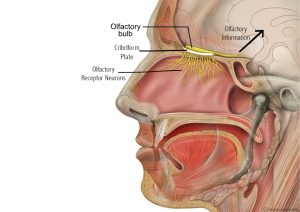
Cherry vanilla pipe tobacco like my grandfather used to smoke—the combination of earthiness, wood, sweet, and fruity is a powerful combination of contrasting smells. I prefer contrasts to complements and that goes for food too. One of my current favorite scents is Jo Malone’s Bronze Wood and Leather—I sometimes layer that with [Jo Malone] Ginger Biscuit. Last fall on a research trip to Bologna Italy, I fell in love with Comptoir sud Pacifique’s Rhum et Tabac. On that same trip, I fell for lemon tortellini—the fats of the pasta and cream with the sour and bitter of the lemon was amazing—especially paired with deep tannic wines that smell of barnyard floors, earth, tobacco, and must. I’ve been told by a chef that I have a very aggressive palate!
References
1. Larsson, M., D. Finkel, and N. L. Pedersen. 2000. “Odor Identification: Influences of Age, Gender, Cognition, and Personality.” Journals of Gerontology – Series B Psychological Sciences and Social Sciences 55 (5): 304–10. https://doi.org/10.1093/geronb/55.5.P304
2. Boesveldt, Sanne, Jason R. Yee, Martha K. McClintock, and Johan N. Lundström. 2017. “Olfactory Function and the Social Lives of Older Adults: A Matter of Sex.” Scientific Reports 7 (February): 1–6. https://doi.org/10.1038/srep45118
3. https://www.uaf.edu/anthro/people/faculty/hoover/
4. https://smellofevolution.com/about/
5. Hayden, Sara, et al. “A cluster of olfactory receptor genes linked to frugivory in bats.” Molecular biology and evolution 31.4 (2014): 917-927..
6. .O’Bleness, Majesta; Searles, Veronica; Varki, Ajit; Gagneux, Pascal and Sikela, James M. 2014. “Evolution of Genetic and Genomic Features Unique to the Human Lineage” 13 (12): 853–66. https://doi.org/10.1038/nrg3336.Evolution.
7. Lachance, Joseph, Benjamin Vernot, Clara C. Elbers, Bart Ferwerda, Alain Froment, Jean Marie Bodo, Godfrey Lema, et al. 2012. “Evolutionary History and Adaptation from High-Coverage Whole-Genome Sequences of Diverse African Hunter-Gatherers.” Cell 150 (3): 457–69. https://doi.org/10.1016/j.cell.2012.07.009.
8. https://en.wikipedia.org/wiki/Paleogenomics
9. Ackerl, Kerstin, Michaela Atzmueller, and Karl Grammer. “The scent of fear.” Neuroendocrinology Letters 23.2 (2002): 79-84.
10. Albrecht, Jessica, et al. “Smelling chemosensory signals of males in anxious versus nonanxious condition increases state anxiety of female subjects.” Chemical senses 36.1 (2010): 19-27
Ese Omoarukhe, University of Reading
For many years, I wanted to attend IFT conferences held in the United States. This year, I finally got the chance to do so, many thanks to the Institute of Food Nutrition and Health (IFNH) of the University of Reading, UK. The IFT19 conference themed “Feed Your Future” held on 2nd – 5th June 2019 in New Orleans, Louisiana, held at the Ernest N. Memorial Centre. Before it commenced, I had the pleasure of attending an earlier programme called the IFT Emerging Leaders Network, which ran from the 31st of May to the 2nd of July.
I’ll start by talking a bit about the IFT Emerging Leaders Network (ELN). IFT describes ELN as a “highly selective global leadership program established for new professionals in the science of food who are eager to expand their leadership skills”. In its fifth year, the ELN programme runs annual over a couple of days prior to the IFT conference. Full eligibility criteria can be found on the IFT website, but in summary food professionals with less than ten years related experience are encouraged to apply. From the applicants, a few with outstanding career profiles are selected for the ELN awards.
At the ELN programme, I met over fifty colleagues from different food institutions i.e. industry, research centres and universities. The content of the programme primarily addressed leadership concepts. Participants of the ELN programme were placed in groups called ‘forums’, in which forum members had a chance to talk about issues on a deeper level in a sort of safe space. My forum was made up of four colleagues besides myself, doing quite inspiration things in their careers. I learnt from our discussions around practical tips on leadership styles, emotional intelligence, conflict management. Thank you Debra Zabloudil and the ELN organisers for the free book titled Emotional Intelligence 2.0, which has impacted my life.
In the main events of the ELN programme, it was wonderful to hear from Debra Zabloudil about effective leadership principles; Prof John Coupland about changes in the food industry through the years; from a panel of experts in food academia, research and recruitment, about how to make an impact with the food profession, giving examples from their personal experiences; from peer mentors about things they had learnt from their ELN programme that had improved their careers; and from social media experts on the best ways to engage with the public on science issues.
Networking was a major part of the ELN programme. On the first day, we met with the members of the IFT board at the Welcome Reception. On subsequent days, there was the Dinner with Participants and Peer Mentors, the International Reception and the New Professional Mixer. On a lighter note, we met IFT colleagues from around the globe at the IFT19 Welcome Reception held at the Mardi Gras, where taster portion sizes of New Orleans cuisine were served. ELN participants also had the opportunity of touring New Orleans downtown. On one of those occasions, I had the pleasure of eating some more New Orleans cuisine. If you haven’t already, you really must try “gumbo”, the official New Orleans state dish.
On the 2nd of June, the IFT conference commenced and as expected, there was so much to see in the exhibits, and lots to learn from the symposia. I didn’t quite manage to see all the exhibitions or attending all the talks, but did experience a fair amount. There were exhibitors for major aspects of the food systems including: ingredients, chemicals, processing machinery, packaging, analysis, services etc. The symposia I witnessed featured talks from researchers, research firms, student challenge sponsors and career services. There were also competitions held primarily for students, such as the Campden BRI Student/Graduate Video competition that encourages PhD students and graduates to translate their thesis to three minute videos. I was privileged to see the videos of the finalists which were so well done. Various meeting held at the conference and hotel venues including alumni, division and section groups. In retrospect, I could have tried to attend division and section group meetings, and really hope I get the chance in future conferences.
So what did I learn from the conference? I learned about the key trends in food. Sustainability, innovation, communication and collaboration (with consumers) were buzz words but also reflected the thoughts and actions of the food system. With respect to communication, it was interesting to see food research and talks translated to artwork in the “Art of Science Translation Competition”. It has inspired me to think of out-of-the-box ways to approach and communicate my research. Clean labelling also featured as quite trendy, with alternative proteins, nutraceuticals, natural additives i.e. sweeteners, fibres, and colours, to mention a few. Moreover, I benefited from all the networking and continued conversations with colleagues and speakers. It is my hope that these conversations will lead to new opportunities for all stakeholders.
I left the conference feeling really excited about the future. I look forward to keeping in contact with as many IFT members as I can, and getting more involved in IFT activities. I have already signed up to volunteer with my local IFT section, and plan to meet section members in the next section meeting. It is still early days since the conference but watch this space. There are greater tales ahead.
Colin Dennis – 2019 recipient of Carl R. Fellers Award
IFT British Section committee member Colin Dennis received the 2019 Carl R. Fellers Award for his life-long dedication to bring honor and recognition to the profession of food Science & technology, and enhancing effectiveness of all food scientists through exemplary leadership.
An enthusiastic and dedicated volunteer who has committed much time to mentoring colleagues, including students and new professionals. Congratulations Colin!
Section Outstanding Volunteer Award – Richard Benson
We are delighted to share that Richard Benson, Treasurer of the British Section, was recognised with the Section Outstanding Volunteer Award this year. A longstanding member and volunteer with the section, Richard is a very worthy recipient. Thank you, Richard, for your dedication!
British Section recognised as a Section of Excellence
We are proud that the British Section was recognised as a 2018-2019 Section of Excellence.
On June 2nd, Bertrand Emond (Committee Chair) and Rhianna Gamble (Marketing and Communications) attended the Section Leadership Forum where they learnt about IFT initiatives, best practices and shared experiences with other section volunteers.
Feeding Tomorrow Fun Run + Fitness
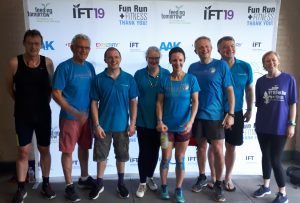 Feeding Tomorrow, the Foundation of IFT, hosted its annual Fun Run + Fitness event which raises money to support scholarships for students pursuing degrees in the science of food.
Feeding Tomorrow, the Foundation of IFT, hosted its annual Fun Run + Fitness event which raises money to support scholarships for students pursuing degrees in the science of food.
The British Section entered the Team Challenge again this year with 7 team members participating at the beautiful Audubon Park in New Orleans. Some of the team did the unstructured group 5k run, some the 1-mile walk, and others enjoyed outdoor yoga by the lake. An amazing way to start the day and for a fantastic cause!
Joint session with IFST and IFSTI on ‘Can we win the fight against food fraud?’
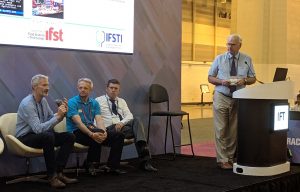 On June 3rd, Bertrand Emond (Chair of the British Section), Jon Poole (Chief Executive of IFST), and Declan Troy and Martin Danaher (IFSTI) joined together to give a session on food fraud on the Traceability Stage at IFT19.
On June 3rd, Bertrand Emond (Chair of the British Section), Jon Poole (Chief Executive of IFST), and Declan Troy and Martin Danaher (IFSTI) joined together to give a session on food fraud on the Traceability Stage at IFT19.
This fascinating interactive session looked at food crimes, and how innovative methods of sharing data and intelligence can help protect the food supply chain.
Kelsey Kanyuck, PhD student at the University of Birmingham, 2017 – present
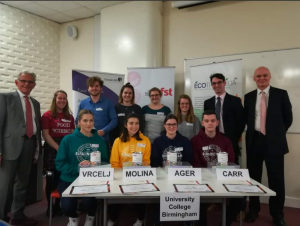 The Institute of Food Science and Technology (IFST) Student Group hosted an inaugural food science trivia competition, the University Challenge, on February 27th at Coventry University. Five Universities (Oxford Brookes University, Cardiff Metropolitan University, University College Birmingham, Coventry University, and University of Nottingham) competed in teams following the style of BBC’s popular University Challenge.
The Institute of Food Science and Technology (IFST) Student Group hosted an inaugural food science trivia competition, the University Challenge, on February 27th at Coventry University. Five Universities (Oxford Brookes University, Cardiff Metropolitan University, University College Birmingham, Coventry University, and University of Nottingham) competed in teams following the style of BBC’s popular University Challenge.
This year, University College Birmingham was crowned the winner and University of Nottingham claimed second place (both pictured below). Hopefully this event will become a recurring event for the IFST Student Group, engaging with more students from a wider range of universities. The British Section has gifted a year membership to each student of the first and second place teams, and the IFTSA is happy to welcome them to the group as well as the IFT British Section.
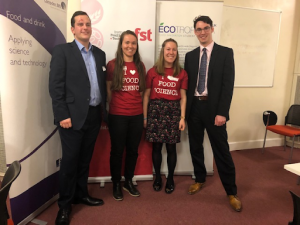 The student association of IFT (IFTSA) maintains partnerships with food science societies across the world, and this year partnered with the IFST Student Group to assist with launching this competition. As a member of the IFTSA board, IFT British Section, and the IFST Student Group, I helped in the execution and preparation.
The student association of IFT (IFTSA) maintains partnerships with food science societies across the world, and this year partnered with the IFST Student Group to assist with launching this competition. As a member of the IFTSA board, IFT British Section, and the IFST Student Group, I helped in the execution and preparation.
The University Challenge was inspired by the success of IFTSA’s College Bowl competition, and IFTSA helped build the question bank and offered advice to leverage the partnership and open new opportunities for student members. A task force of IFT student members was created to collaborate with the IFST student group in writing and reviewing of questions (over 1000 were written!). Both groups are proud of the success of the event and are looking forward to continued collaborations of the student groups.
In December 2018, we jointly hosted the Binsted Lecture with our friends and colleagues at IFST. Approximately 50 people joined us at the FDF offices for the lecture followed by drinks.
Our speaker was Dr Michele Perchonok, President of IFT and former Shuttle Food System Manager of the NASA Human Research Programme. Dr Perchonok spoke about about how to feed astronauts in space, with a particular focus on the logistics of long missions like a potential 5-year mission to Mars.
For the benefit of those who were unable to join us, we are pleased to share the video of this fascinating talk. Enjoy!
Anna West Waller, PhD student in the Department of Food Science and Human Nutrition at the University of Illinois at Urbana Champaign, 2016 – 2020
Post will also be published on the IFT website
Usually, the opportunities and connections presented throughout life are by chance. If you’re lucky, these random interactions jumpstart new careers, spark groundbreaking ideas, or create lifelong relationships. In my case, as is the case for many food scientists, I didn’t grow up thinking I’d be a food scientist. Yet somehow, by many chance interactions and opportunities along my own path, I am a third year Ph.D. student at the University of Illinois studying food science and human nutrition. The last 10 days, however, were filled with a number of carefully planned interactions, each one thoughtfully intended to spark a new idea, create lifelong friends and colleagues, or possibly jumpstart a career post-grad. This unique experience was in the UK, all in thanks to Campden BRI and IFT’s Graduate Student Research Video Competition.
The competition involved creating a 3 minute video about my global nutrition research, practicing clear and concise science communication to the public. Upon being selected as a finalist, I won the prize at the annual IFT conference to come to the UK for 10 days in November for a tailored experience to understand the food and nutrition industry in this part of the world.
The trip began in Chipping Campden, a beautiful town situated at the north of the Cotswolds – a magical stretch of towns spanning all the way to Bath. The evening was spent strolling through the main district, walking off the jet lag while admiring the historic buildings and market hall. I then spent the following day at Campden BRI’s headquarters.
I was welcomed by Bertrand Emond who organized this 10-day program and who is also the Chair of the IFT British Section. We toured the labs, pilot plants, and met a number of scientists along the way. I presented a lunchtime talk about my research as well – introduced by past IFT President and ex Director General of Campden BRI, Colin Dennis – further practicing science communication skills to a broad audience.
The following 3 days were spent at London’s annual Food Matters Live event, listening to a fascinating lineup of speakers and networking with UK’s food and drink industry. On the closing day, I was invited to participate on a panel following a screening of IFT’s Food Evolution – organised by the IFT British Section.
Before spending the weekend sightseeing with friends in London, I made a quick trip to Norwich, England, with Campden BRI’s Sian Twinning. We toured impressive facilities at the research park and engaged with many scientists and students at the collaborative research institutions including the Quadram Institute, the Earlham Institute and the John Innes Centre (JIC).
The following days in London were spent with the Royal Society for Public Health and the British Nutrition Foundation, renowned charities working to improve the health and wellbeing of the UK population, and Waitrose, a prominent grocery chain in the UK which has its own foundation for international development. Each visit was inspiring; the passionate scientists, public health specialists, and development specialists engaged in thoughtful conversations about policy, nutrition interventions, and program implementation.
Finally, the UK experience was even complete with a trip to Aberdeen, Scotland, with Emma Burton from Campden BRI. We visited the Rowett Institute, proudly recognized as one of the world’s leading nutrition research centers over the last 100 years. We received a warm welcome throughout the day and had the opportunity to learn from many of their scientists. I also had the opportunity to present my research during the lunchtime seminar series, providing a unique platform for cross-cultural discussions and potential collaborations in the future.
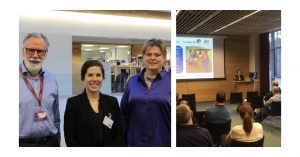 Overall, the 10 days were inspiring, engaging, and unique. By chance, these conversations and interactions in sum could maybe occur over years, or in a life’s work in the food and nutrition field. But only by the attentive and tailored planning by Campden BRI could it have happened in 10 days at such a pivotal time in my career, all whilst exploring a new and beautiful part of the world. I’m so grateful for the opportunity to learn from UK’s best and brightest minds in the fields of nutrition policy, food and nutrition science, and international development. Only time will tell how these tremendous connections, ideas, and relationships might positively impact my career and the new nutrition science developments ahead.
Overall, the 10 days were inspiring, engaging, and unique. By chance, these conversations and interactions in sum could maybe occur over years, or in a life’s work in the food and nutrition field. But only by the attentive and tailored planning by Campden BRI could it have happened in 10 days at such a pivotal time in my career, all whilst exploring a new and beautiful part of the world. I’m so grateful for the opportunity to learn from UK’s best and brightest minds in the fields of nutrition policy, food and nutrition science, and international development. Only time will tell how these tremendous connections, ideas, and relationships might positively impact my career and the new nutrition science developments ahead.
Anna is the winner of the 2018 Campden BRI IFTSA Thesis Video competition. Watch her winning entry.
Anna West Waller, PhD student in the Department of Food Science and Human Nutrition at the University of Illinois at Urbana Champaign, 2016 – 2020
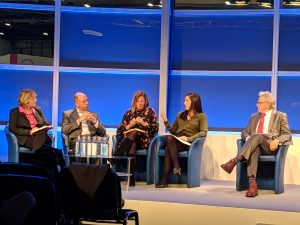
Anna’s PhD aims to develop, optimize, and validate rapid and accurate vitamin A and iron sensor technologies to address quality control and compliance in food fortification nutrition intervention programs in low-income countries
Anna is the winner of the 2018 Campden BRI IFTSA Thesis Video competition. Watch her winning entry.
As part of her prize, she will spend 10 days in the UK visiting various institutions and taking part in Food Matters Live including the Round Table following the screening of Food Evolution.
Blessing Nwokocha, Reading University, UK
Published 29 August 2018
The IFTSA 2018 Global Challenge was a memorable experience indeed. It was an event packed with activities to educate, inspire and motivate.
As I arrived the Hilton Hotel Downtown Chicago, I was filled with excitement. I couldn’t help but beam with smiles from ear to ear as I walked towards the elevators observing the signposts signalling “IFT18 Registration”. Although tired from the journey, I was brimming with enthusiasm, as I dragged my suitcase along and made my way to my room. It felt really good; IFT18, First timer, Global Challenge participant!!!
It all started when I was selected to participate in the IFTSA Global Challenge after taking part in an IFST competition in the UK. The competition involved writing about the issues facing the global food industry in the next five to ten years. I started by carrying out an investigation on the global food industry and the contemporary trends. This little distraction was very different from my laboratory experiments and current research, so it felt wonderful to take a break and explore something different.
Arriving a night before the event commenced gave me ample time to tour the city. The Chicago River, in particular, was a remarkable sight. The following morning, there was the First Timers’ Welcome Session in a hall filled with students from different parts of the world. A briefing session for the Global Challenge participants was next, which comprised of undergraduate and graduate students from different countries such as the USA, UK, Canada, Belgium, Malaysia, South Africa and China. We were a total of 20 students forming five teams of four. Each team was assigned a mentor from the food industry. Meeting these students and discovering the difference in our courses and cultures was interesting. The Awards Ceremony and Networking Events followed afterwards. These were great networking platforms. We were introduced to the board members of IFT and the student body. We were also privileged to be the first set of students invited to the International Partners Reception.
The air was rife with suspense as each Global Challenge team was called to pick up their challenge. My team’s challenge was the “clean label” trend, with the challenge of replacing all artificial colours and flavours in a nacho cheese dip, with natural ingredients. The Expo Floor was the major source of information for finding solutions. Prior to the conference, I had heard a lot about the grand nature of the Expo floor but the descriptions did not compare to the actual magnificence.
After several visits to the exhibition booths, holding discussions with exhibitors from the ingredient companies, we came up with a variety of options to formulate a new product, using clean label ingredients, while retaining functionality and sensory attributes. Important factors such as cost, legal requirements, ingredient availability and sustainability were also considered. With guidance from our mentors, brainstorming and the application of our knowledge of food science, we came up with three clean label formulations.
There were workshops on innovation and key career tools, such as, leadership for new hires, organised for the global challenge participants. These helped to broaden my outlook concerning my career aspirations. Other activities going on included poster sessions, lectures, college bowl competitions and division meetings. The IFT18 App proved quite handy in my planning of the sessions to attend.
I was one of two students representing the IFST. We were both truly privileged to be invited to dine with the representatives from the IFST and Campden BRI, in one of the top recommended restaurants in Chicago town.
Considering the benefits of taking part in the IFTSA Global Challenge, I would recommend every student to apply for it. It provided me with invaluable opportunities for skills acquisition and learning, such as, improving my ability to work in teams and enhancing my problem solving and creative thinking skills. Learning directly from our mentors and gleaning from their wisdom and experience, was priceless. Presenting our team’s solutions and listening to other teams’ presentations were key to improving my communication and presentation techniques.
Naturally, I eagerly anticipated and enjoyed my visits to the booths. The exhibitors were always so willing to provide answers to our questions and to share their recent developments. In addition, I amassed a number of useful literature and leaflets on products and new technology, several branded bags, and free samples from various companies.
The Global Challenge was so well organised that I found I had gained so much in so few days. The knowledge acquired has provided more insight into potential career options after my PhD. It has also broadened my perspective of the Food Industry and on how to channel my research towards addressing some global food issues.
In general, the IFTSA Global Challenge has been a most rewarding, inspiring, and fun-filled experience. I am so glad that I participated and do encourage other students to do same.
Antonio Lonigro, Sheffield Hallam University, UK
Published 6 August 2018
IFT (Institute of Food Technologists) hosted the “Global Challenge 2018” in Chicago from 15th to 18th July. We had the honour to participate thanks to the collaboration between IFT and IFST (Institute of Food Science and Technology). In order to take part to the competition we had to go through a national competition launched by IFST early in the year. The competition consisted in writing an essay (500 words) that identifies, explains and proposes solutions to a global food challenge.
Twenty students from the USA, China, South Africa and Puerto Rico joined us in the competition under the guidance of IFTSA (Institute of Food Technologists Student Association).
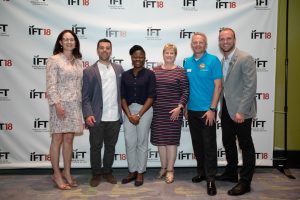
On our first day, after registration, we gathered all together and we were divided into five groups of four students. Each group had an expert mentor that guided us in finding the best solution to the challenge. After being divided into groups we had to randomly picked a real-world based case study. To find a solution to our case study we were asked to use all the tools and resources from the expo (e.g. Brochures, samples). For instance, my group had to develop an energy bar and find a suitable method to incorporate nutrients or other compounds to improve gut health.
In order to be able to come up with a suitable product we took part to talks, presentations, scientific session, but above the majority of the inspirations derived from the expo floor. Thousands of expositors from across the world created the perfect environment for us to understand what is new in the food industry and what products could be used to overcome the challenge. Moreover, this was a great opportunity to create networks with experts in the field.
In the end of the three days challenge we were required to give a brief presentation about the product and the rationale used to tackle to problem. This gave me the opportunity to show my skills in terms of team working and presentation to an audience. Furthermore, during the three days challenge we, as a group, also started to share previous experiences, skills and different points of view. For example, I had a constructive discussion with a US student about food labelling and the differences between the US and the UK. This exchange of opinions and knowledge was, for me, the highlight of the entire challenge.
In the the three days at the expo, I have come across a countless number of new products that did not even know existed, such as hemp chocolate bar (very nice!) or ready to eat popped brown rice. From this experience I have learnt that it is very important to expand own knowledge, scanning and researching all around the world for new ideas and inspitantions. This is a new skill that will allow any students to be more creative and open-minded.
In conclusion, I would definitely recommend to apply and participate to this competition because it is a great opportunity to expand knowledge, create new connections in the field and share the experience with other students and exchange views and experience.
Zachary Cartwright, a student at Washington State University, visited the UK in 2017 as the winner of the 2017 IFT Video Thesis Award sponsored by Campden BRI.
Focusing on Enology, Zachary’s trip included visits to the Campden BRI offices, attending the Food Matters Live conference and a wine festival, and touring vineyards and wineries.
To learn more about Zachary’s trip:
In the last few weeks, Food Evolution begun its European Tour with screenings in Brussels, (European Parliament, Royal Society of Belgium for Science & Arts) London, Dublin, and Edinburgh, (Courtesy of USDA), Bucharest, (Science Festival) and Rome (FAO), Beirut Film Festival, Mexico City and Cape Town (SAAFOST Conference).
The film is now also available on video-on-demand platforms- iTunes, Amazon Video, Google Play and You Tube and also on the subscription platform Hulu.
IFT is also in discussion with affiliates of the Bill & Melinda Gates Foundation who are interested in helping make sure the film is available in many African countries in Africa where distribution can be more challenging and costly.
The demand for private screenings by companies, NGO’s, government bodies, universities and other institutions are on the rise.
IFT also has plans for the development guides which can be used in the classroom when the film is screened as part of a curriculum. A 52 minute “educational cut” has already been produced.
Further details and reactions to the film can be viewed at foodevolutionmovie.com where you can also sign up to receive updates from the Director Scott Hamilton Kennedy.
On 3 May, we held the first UK screening of IFT-funded and commissioned film, Food Evolution, at SCI in London. We had a fantastic turnout, with around 50 attendees from industry and academia.
We were delighted that Professor John Coupland, 2016-2017 IFT President, and Tom Foley, Senior Director of Membership were able to join us from the US.
The film was followed by a discussion led by Professor Coupland a6nd Professor Colin Dennis, 2015-2016 IFT President, and a drinks reception.
Section Treasurer Richard Benson brought along a book of minutes from the 1960s, showing us a fascinating piece of section history.
We held a joint session with IFST at Food Matters Live, on 22 November 2016 in London. We were delighted to have with us Amadeus ‘Ando’ Ahnan from University of Massachusetts Amhurst, who presented his research on ‘Anti-oxidants from blueberries: have they the potential to impact colon cancer cells?’. Ando’s work was featured at the 2016 IFT Annual Conference in Chicago, where his thesis video took the star prize for science communication.
As well as Ando’s work, the session included an update on IFT activities, information on the IFT British Section/IFST joint membership, and highlights from the IFT conference to provide an opportunity for those who could not be there to tap into the insights shared.
On 14 September 2016, we had a highly enjoyable evening of wine exploration with Geoff Taylor, Campden BRI’s wine and spirits expert, at SCI in London.
Geoff Taylor’s experience and expertise in wine and wine-making is renowned, and his contribution is sought on matters as varied as the latest edition of Jancis Robinson’s The Oxford Companion to Wine (“the greatest wine book ever published” according to The Washington Post) to wine fraud!
By comparing wines from the Americas with similar varieties from Europe, we took a delicious and insightful tour of the science of wine.